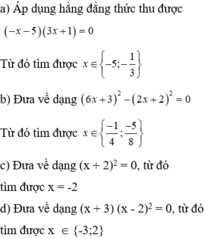Giải các phương trình mũ sau:
Hãy nhập câu hỏi của bạn vào đây, nếu là tài khoản VIP, bạn sẽ được ưu tiên trả lời.

\(a,\dfrac{x-3}{x}=\dfrac{x-3}{x+3}\)\(\left(đk:x\ne0,-3\right)\)
\(\Leftrightarrow\dfrac{x-3}{x}-\dfrac{x-3}{x+3}=0\)
\(\Leftrightarrow\dfrac{\left(x-3\right)\left(x+3\right)-x\left(x-3\right)}{x\left(x+3\right)}=0\)
\(\Leftrightarrow x^2-9-x^2+3x=0\)
\(\Leftrightarrow3x-9=0\)
\(\Leftrightarrow3x=9\)
\(\Leftrightarrow x=3\left(n\right)\)
Vậy \(S=\left\{3\right\}\)
\(b,\dfrac{4x-3}{4}>\dfrac{3x-5}{3}-\dfrac{2x-7}{12}\)
\(\Leftrightarrow\dfrac{4x-3}{4}-\dfrac{3x-5}{3}+\dfrac{2x-7}{12}>0\)
\(\Leftrightarrow\dfrac{3\left(4x-3\right)-4\left(3x-5\right)+2x-7}{12}>0\)
\(\Leftrightarrow12x-9-12x+20+2x-7>0\)
\(\Leftrightarrow2x+4>0\)
\(\Leftrightarrow2x>-4\)
\(\Leftrightarrow x>-2\)


1: Ta có: \(\dfrac{3}{x-3}+\dfrac{4}{x+3}=\dfrac{3x-7}{x^2-9}\)
\(\Leftrightarrow\dfrac{3x+9}{\left(x-3\right)\left(x+3\right)}+\dfrac{4x-12}{\left(x-3\right)\left(x+3\right)}=\dfrac{3x-7}{\left(x-3\right)\left(x+3\right)}\)
Suy ra: \(3x+9+4x-12=3x-7\)
\(\Leftrightarrow4x=-7+12-9=-4\)
hay \(x=-1\left(nhận\right)\)
2: Ta có: \(\dfrac{3}{x-4}-\dfrac{4}{x+4}=\dfrac{3x-4}{x^2-16}\)
\(\Leftrightarrow\dfrac{3x+12}{\left(x-4\right)\left(x+4\right)}-\dfrac{4x-16}{\left(x+4\right)\left(x-4\right)}=\dfrac{3x-4}{\left(x-4\right)\left(x+4\right)}\)
Suy ra: \(3x+12-4x+16=3x-4\)
\(\Leftrightarrow28-4x=-4\)
\(\Leftrightarrow4x=32\)
hay \(x=8\left(tm\right)\)
3: Ta có: \(\dfrac{5x^2-12}{x^2-1}+\dfrac{3}{x-1}=\dfrac{5x}{x+1}\)
Suy ra: \(5x^2-12+3x+3=5x^2-5x\)
\(\Leftrightarrow3x-9+5x=0\)
\(\Leftrightarrow8x=9\)
hay \(x=\dfrac{9}{8}\left(nhận\right)\)

a) ( 4x - 1 ) (x - 3) - ( x - 3 ) ( 5x + 2 ) = 0
<=> (x - 3)(4x - 1 - 5x - 2) = 0
<=> (x - 3)(-x - 3) = 0
<=> x = 3 hoặc x = -3
b) ( x + 3 ) ( x - 5 ) + ( x + 3 ) ( 3x - 4) = 0
<=> (x + 3)(x - 5 + 3x - 4) = 0
<=> (x + 3)(4x - 9) = 0
<=> x = -3 hoặc x = 9/4
c) ( x + 6 ) ( 3x - 1 )+ x2 - 36 = 0
<=> 3x^2 + 17x - 6 + x^2 - 36 = 0
<=> 4x^2 + 17x - 42 = 0
<=> 4x^2 + 24x - 7x - 42 = 0
<=> 4x(x + 6) - 7(x + 6) = 0
<=> (4x - 7)(x + 6) = 0
<=> x = -6 hoặc x = 7/4
d) ( x + 4 ) ( 5x + 9 ) - x2 + 16 = 0
<=> 5x^2 + 29x + 36 - x^2 + 16 = 0
<=> 4x^2 + 29x + 52 = 0
<=> 4x^2 + 16x + 13x + 42 = 0
<=> 4x(x + 4) + 13(x + 4) = 0
<=> (4x + 13)(x + 4) = 0
<=> x = -13/4 và x = -4

1:
a: =>3x=6
=>x=2
b: =>4x=16
=>x=4
c: =>4x-6=9-x
=>5x=15
=>x=3
d: =>7x-12=x+6
=>6x=18
=>x=3
2:
a: =>2x<=-8
=>x<=-4
b: =>x+5<0
=>x<-5
c: =>2x>8
=>x>4


Chia hai vế cho 12 x ( 12 x > 0), ta được:
4 3 / 4 x + 1 − 3 4 / 3 x = 0
Đặt t = 3 / 4 x (t > 0), ta có phương trình:
4t + 1 − 3/t = 0 ⇔ 4 t 2 + t − 3 = 0
Do đó, 3 / 4 x = 3 / 4 1 . Vậy x = 1.